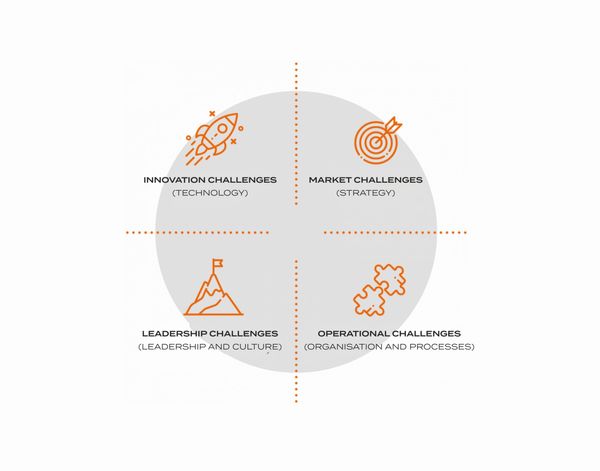Facebook has announced that it will now operate its social networking sites under the Meta brand: this implies more than just a name change, it also foreshadows the creation of a metaverse by combining augmented reality (AR) and virtual reality (VR) technologies.
Related to this topic, in our previous article we discussed the special interaction between the digital space and man and the role of a metaverse in it. This time, ethics, equality, controllability and the possible future of Facebook Meta will also be discussed. We talked to Árpád Rab, futurologist and trend researcher. Part two!
It was less than ten years ago that you said in one of your presentations that the most important question for the next decade is how we can use technology to create value. How is this going now? How will a metaverse become ethical?
In answer to the first half of the question, I think we are doing fine. In fact, value-creating use means that we use it not only for our own purposes or for entertainment purposes, that is, we not only use it as a product, but also actually initiate something with it. Just think of how suddenly these technologies grew when the coronavirus epidemic arrived and humanity switched to distance learning in two days. The fact that we were able to share information online, that we were quarantined but we weren’t alone and that we were able to organize a lot of things, shows that we are not only consuming the internet, but we also increasingly use it to solve everyday problems. For example, political and civil forces, as well as educational and scientific organizing forces are also established; we are looking smarter and finding out how we can do yoga online or learn a new language online. This is one of the value-creating levels we are very good at, but obviously, we have been manipulated commercially.
The next truly value-creating level will be when critical infrastructures move into the digital space. What do I mean here? When a robotic doctor is going to heal remotely or a robotic lawyer judges cases objectively in five minutes. The more everyday life situations and problems we solve, the more value-creating we use the technology.
Whether it is ethical… I have referred to this issue earlier by saying that we are commercially manipulated. Social media is a corporate environment that is creating serious tensions: the need to regulate Facebook is now the most apparent in the wider world. Everyone feels that a company has come to too much power, because that has become the air now. So far, people have been able to talk to each other through the air, but now it’s Facebook.
Currently, the company is referred to as the champion of free speech or the crusher of democracy: Facebook is the former itself, but there are characters who claim the latter. In fact, it is somewhere in between, and several characters have a responsibility for this.
On the one hand, the awareness of users need to be raised. On the other hand, it is a manipulated environment, but that is not a problem, so you can’t be angry with them. Companies have never claimed otherwise, and we must not forget for a moment that there are no coincidences in the digital space. Social media itself, so the metaverse, can’t be ethical either, and we’ll not be able to regulate that. It is not Facebook that needs to be regulated, but certain features of it that we consider harmful, but it will never be ethical as it is a corporate environment.
Zuckerberg says he and his team want to build a “living-breathing” world in virtual reality where there will be no physical boundaries and we can furnish the space around us the way we want. However, it also means that it will become increasingly difficult to separate the real (physical) and digital worlds. In a simulated world, will the same rules apply as in reality? To what extent will it map our social system? Or does everyone become equal in a metaverse?
We like to believe that a digital world will bring digital democracy and utopia—the same could have been thought of the internet at the time. How good it will be if an unknown poet living in the countryside can become world-famous, but it turns out that it is not possible because we exist in self-generated bubbles, so we don’t see his poems unless we’re Facebook friends. Social inequalities are actually reproduced and exacerbated by these technologies.
It is impossible for everyone to be equal. However, providing basic experiences in a digital space is not a problem: everyone can have the most expensive car or more land—unless we are in a common digital world. If a virtual space is just mine, I can get everything in it, but if there are many other people in this world, we will encounter the same situations as in the real world: since we exist in the same place, there will be rules and someone will be able then to get that nice car.
On the other hand, humanity is constantly changing itself: what we take for granted now was not at all evident in the culture a hundred years ago, and there are some among them that are only fifty years old. In a hundred years, we may have core values that are completely far from what we now consider to be—this is one of my areas of research, among other things.
In terms of social organization, this will be completely different in the metaverse. We already know that it will certainly push social inequalities, but we will still shape what new values it will move.
We will look back on the world today as we look back on life two hundred years ago with a little pitiful smile. In the future, they will think back to us in the same way and wonder, “People went to a physical place to meet—it is strange as there is hologram for that purpose.”
In one of your previous conversations, you highlighted that at first, people thought what was happening in the digital space was not so much a reality. At the human level, in fact, it is still separated from its real and virtual, or so to speak, Internet selves. In a metaspace where there is less stake, can solutions be found for ecological or other problems, for example?
I believe in this, yes. I have also seen this when working on international and Hungarian projects because it is not really the technology that matters, but the person. Technology only solves things: it is a channel of transmission. For example, I can help a visually impaired person from a distance to get the right bread off the shelf with a simple technology we now use to chat; but I can also generate a social debate about whether or not there is water in the houses in a street. It also includes the fact that women in African society can be new organizing forces, talking to each other, completely changing the structure of society.
Due to the overexploitation of resources, we very often only see the problems of the developed world, but when we go down to the so-called “field”, we also face challenges such as having to distribute water or teach without a teacher available—these can all be solved well with technology. We still solve a lot of social problems with it, but here we have to pay attention to the fact that we are talking about two different directions.
Companies are developing services that they want to sell to us and that they will say is good for us. However, the opposite should happen: society should be active. We need to articulate what our problem is, and from that, what we are solving with the help of technology, and what we are not—not starting from the service side. A lot of times we don’t perceive the social impact of technology because we look at what is being sold to us.
Take, for example, the issue of the climate crisis: based on what you have said, can a metaverse be a good tool in solving this problem?
It can be one of many tools—in the sense that being more conscious is something that happens in our heads, but technology will help us better organize and conserve our resources. Furthermore, to work together on bigger issues, to have common dreams, to be able to argue in a way that saves our resources even if we do not travel by car to a meeting, but in this metaverse, they would all help the Earth a lot. The smarter we will use it, the more different points we will solve with it, and then one day a bigger picture will emerge.
It is certain that we will save the environment with the help of info-communication technologies. I say this also because we do not want to save the Earth—the Earth is doing perfectly well without us. We want to save ourselves and that makes a big difference.
We can think of several video games, movies or even series about a metaworld. One of my favorite associations is the Black Mirror anthology series, which presents dystopias for the near future. There is an episode that takes place in a city created as part of a simulated reality, where the elderly can live after their death. Digitizing, downloading, and storing human consciousness is increasingly preoccupying researchers: many want to be immortal. How can the metaverse of Facebook and this kind of endeavor be linked?
They can be connected in a distant sense, but that is not the purpose of this development. The human body actually works in the same way as a computer: we operate in the same way with electrical signals and our senses can be deceived. From Plato’s cave allegory to the Matrix film, it all shows that what we perceive around us is actually a created reality.
The great experience in the metaverse will be that I can finally live in a world where I do what I want to do, and if my senses are given impressions that show me a real world, then it will work. Facebook is preferred because it knows us: so far, nothing has known our habits, our favorite music, or our friends so well. Tinder, for example, knows what kind of men or women there are, and Instagram knows what kind of landscapes we like. Regarding the living-breathing metaverse, the creator of Facebook intended that it would not be a sterile but a virtual world personalized for everyone: that is, I would see landscapes or cars in it that I love, and that’s why I’ll really like this virtual space.
We cannot digitalize consciousness itself at the moment because man is a very irrational being: we are able to love and hate at the same time, all sorts of things are swirling in our heads—we are like that. However, in the last twenty years, human thinking has come a long way towards robotic thinking: we have become very rationalized, we are stifling our emotions. If we continue down this path, it will not be so difficult to digitize us. There is no realistic chance of this yet, but the distant goal is that. But even if that happens, a world needs to be created for that consciousness to feel good in it, and that’s where Facebook is best now: in that sense, the metaverse will be there, and then it’ll provide the business of it.
Social media interfaces already existed before Facebook, such as iWiW in Hungary or MySpace from the international side, but Google also had similar aspirations: these platforms eventually failed. What future can be predicted for the Facebook metaverse?
One of the basic laws of e-business is that there is no middle ground: the big ones carry everything. The little ones carry local or very special goods and services. At the moment in the Western world, Facebook holds its top place very well, and the truth is that it is only growing year by year because the amount of data it has is growing: it will slowly be more expensive to get rid of Facebook than to keep it. Facebook, Instagram, and many other services we know belong to one company, but theoretically, they are separate companies: so the metaverse may be spectacularly fragmented, but it will exist. Facebook has no competition right now and doesn’t want to have—obviously many others want the same, but Facebook is in the lead.
Yet I think the future and the structure of society will be much more determined by Google and Apple-level companies, where hardware, software, and innovation can meet better.
We now live in the age of social media, but critical infrastructures like robotic doctors or self-driving cars, robotic teachers are about to emerge: Facebook is not leading in this—Facebook is good at human manipulation. I think there will be companies that won’t replace Facebook, but they will diminish the importance of this form of the social network site.
Illustrations by László Bárdos

Vogue Travel: A guide to Poland like you haven’t seen before

Thinking in a system—the KÜRT Academy’s future-proof model










